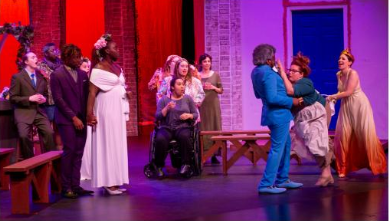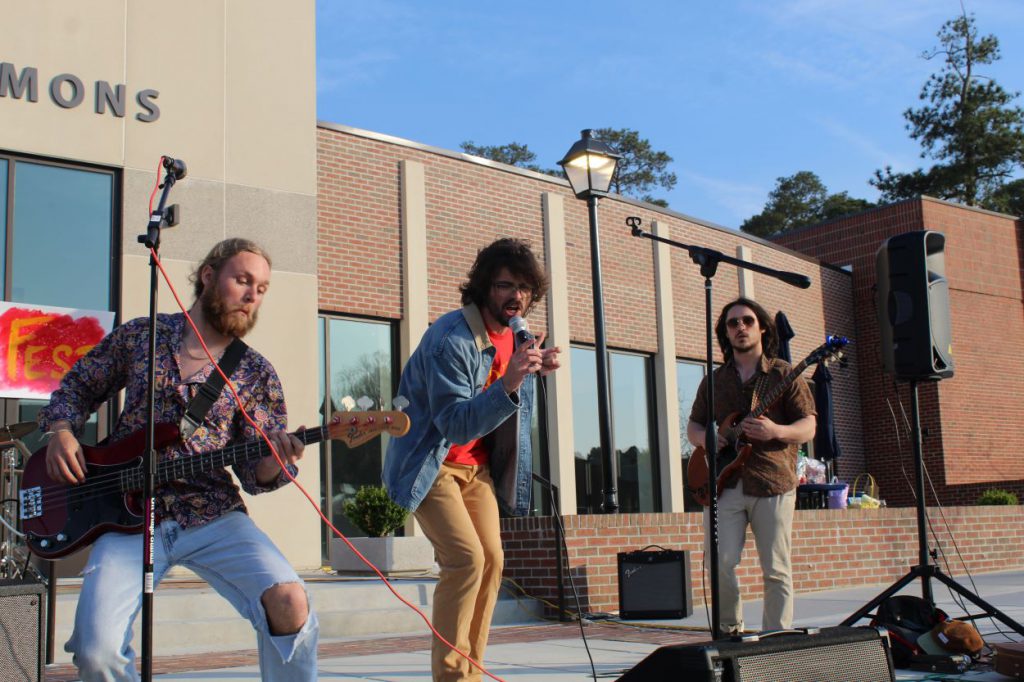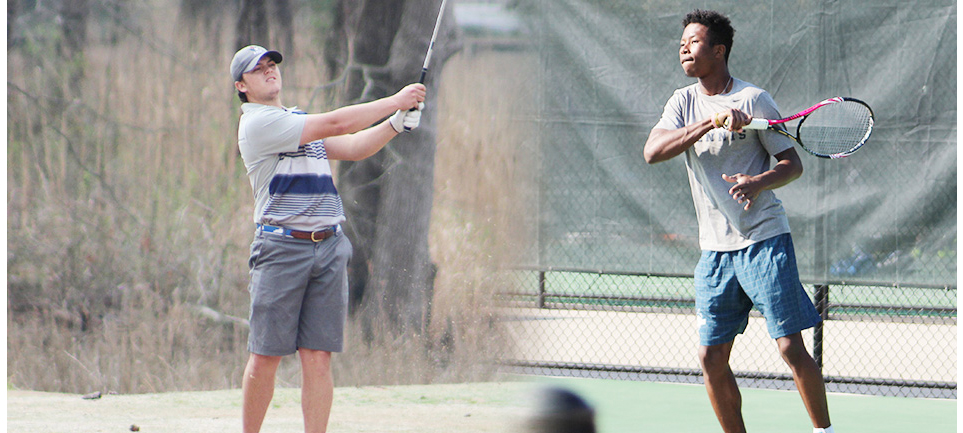Students perform a contemporary rendition of Greek literature and veteran advocacy.
Consisting of plot twists, rich humor and a double wedding, the Theatre Department put on a production of The Shield based on Menander’s Aspis. The production ran from March 5-8 in the Brock Theatre of the Goode Center. Dr. Travis Malone, VWU’s Dean of the Susan S. Goode School of Arts and Humanities and professor of theatre, and sophomore Cecilia Ward, dramaturge and playwright, worked diligently to make this performance come alive.
“The idea of The Shield came about last year because I started working with Dr. Haller in the Classics department to bring to campus Dr. Peter Meineck and The Warrior Chorus event,” Malone said. “We thought it would be a really good idea to continue that process of thinking about veterans and veteran’s affairs and work through and use this play as an example and also give us the opportunity to develop something new.”
Malone continued, “Cecilia Ward is the co-playwright for the play. She helped do a lot of adapting of Ancient Greek stuff and then I added a lot throughout, and we developed together the rest of it.” In the “About The Production” page of the playbill, Cecilia Ward commented on the adaptations that they had made in order to make this piece relevant to today’s contemporary society.
Ward wrote, “We carefully edited the social context of slavery within the play, knowing that a modern American audience would not be able to disconnect their own notions of American Slavery with Greek Slavery despite the two being distinctly different institutions. Additionally, we changed the relationships including incestuous marriages because it similarly has a negative context in contemporary American society.”
Even though Menander was considered the most famous playwright of his time, there are no surviving texts. What makes this production so unique is that Menander’s Aspis is not a complete play. There was room for artistic flexibility. “With the first three acts, we have about 20 lines from act number four and then there’s nothing left from act five,” Malone said. “So, getting the opportunity to develop that is a challenge and sounds like a lot of fun.”
And a lot of fun it was. Students from all sorts of different backgrounds owned the stage as they interacted with each other to tell the audience the story about the trauma of war and how it affects everyone. The main character, Dave, finds his best friend, Michael’s, flak jacket on a battlefield and presumes him to be dead. Spoiler alert: Michael is not dead. What follows afterwards is an intricate plot of greedy godparents, broken hearts, love, hope and optimism. There was an underlying story of soldiers returning from war embedded between scenes. These quick acts gave a small glimpse into how society acts poorly towards returning war veterans and offered insight into the struggles of veterans trying to adjust to civilian life again.
Junior Chasida Taylor played Liberty, Michael’s fiancée. “It was quite enjoyable, but in the beginning, it was quite challenging because I was playing this role of a strong independent female, but I was playing it with anger rather than defeat. I didn’t want to play into the stereotype of an angry black woman. I was so used to a set script, but Travis gave me the basis of the script and allowed me to grow into that character,” Taylor said. “He gave me things that I could do, and it was up to me to figure out how I wanted people to see Liberty and how I wanted to portray her. Overall, I say that it was a frustrating yet rewarding experience because I saw a whole other side of theater.”
The play grappled with themes of pain, suffering and hope. By enhancing the play to fit into today’s society, Malone hoped that the audience would be able to answer and really think about this question that he asked in the Director’s Note, “What are we doing to help those returning home to make their lives and those whose lives are shattered by war?” Malone said, “I hope they [the audience] recognize the potential in ourselves to continue to divide ourselves within our own houses and our communities and the opportunity to help them heal. And sort of helping audiences to recognize that that tension exists, and we could all be a part of the divide but in the optimistic hope of that we are more and that we really all prefer to be helpful and a part community.”
Freshman Jacob Kokoszka was among those that attended the performance. Kokoszka said, “I thought it was an interesting twist on how they showed the military coming back home and how it affected those around them, but at the same time it showed how the soldiers were affected and dealing with loss and depression. Using a play to portray these emotions was really interesting because they tried to show something serious, but with a humorous tone to it. It still managed to get its point across in the end.”
Faith Macwana
fpmacwana@vwu.edu



